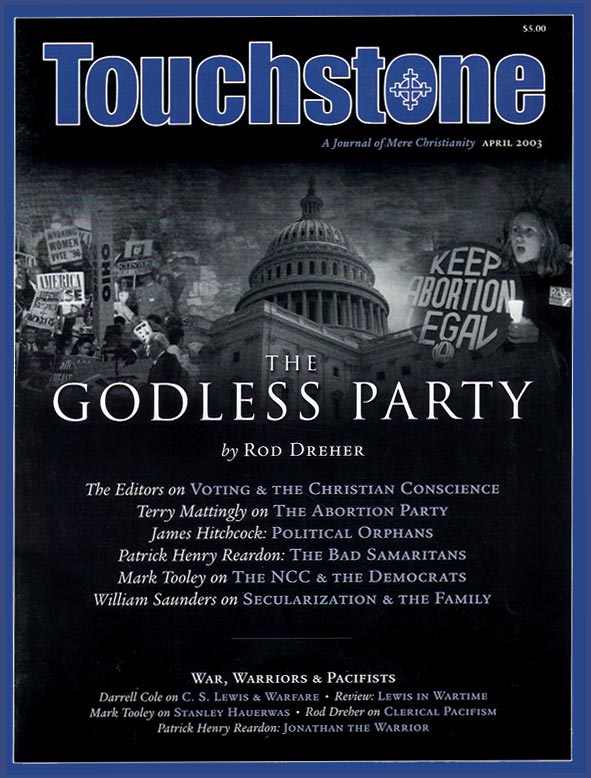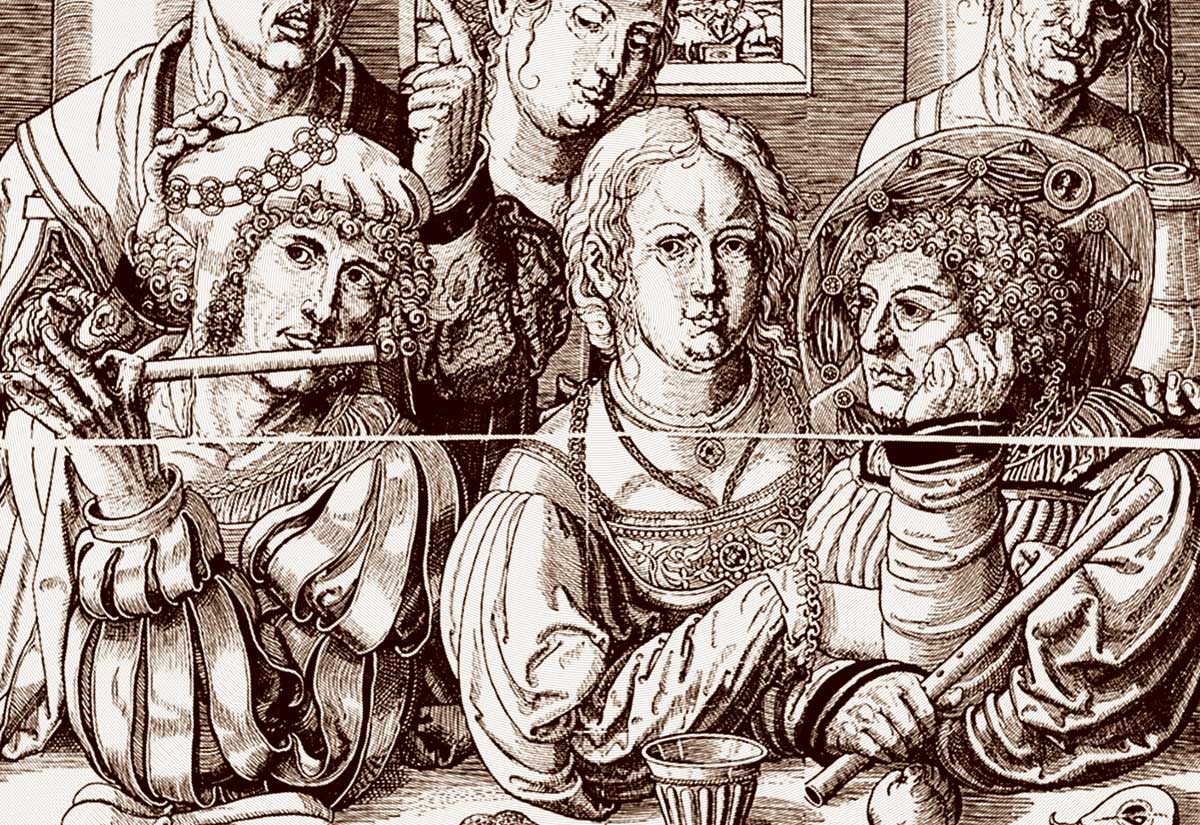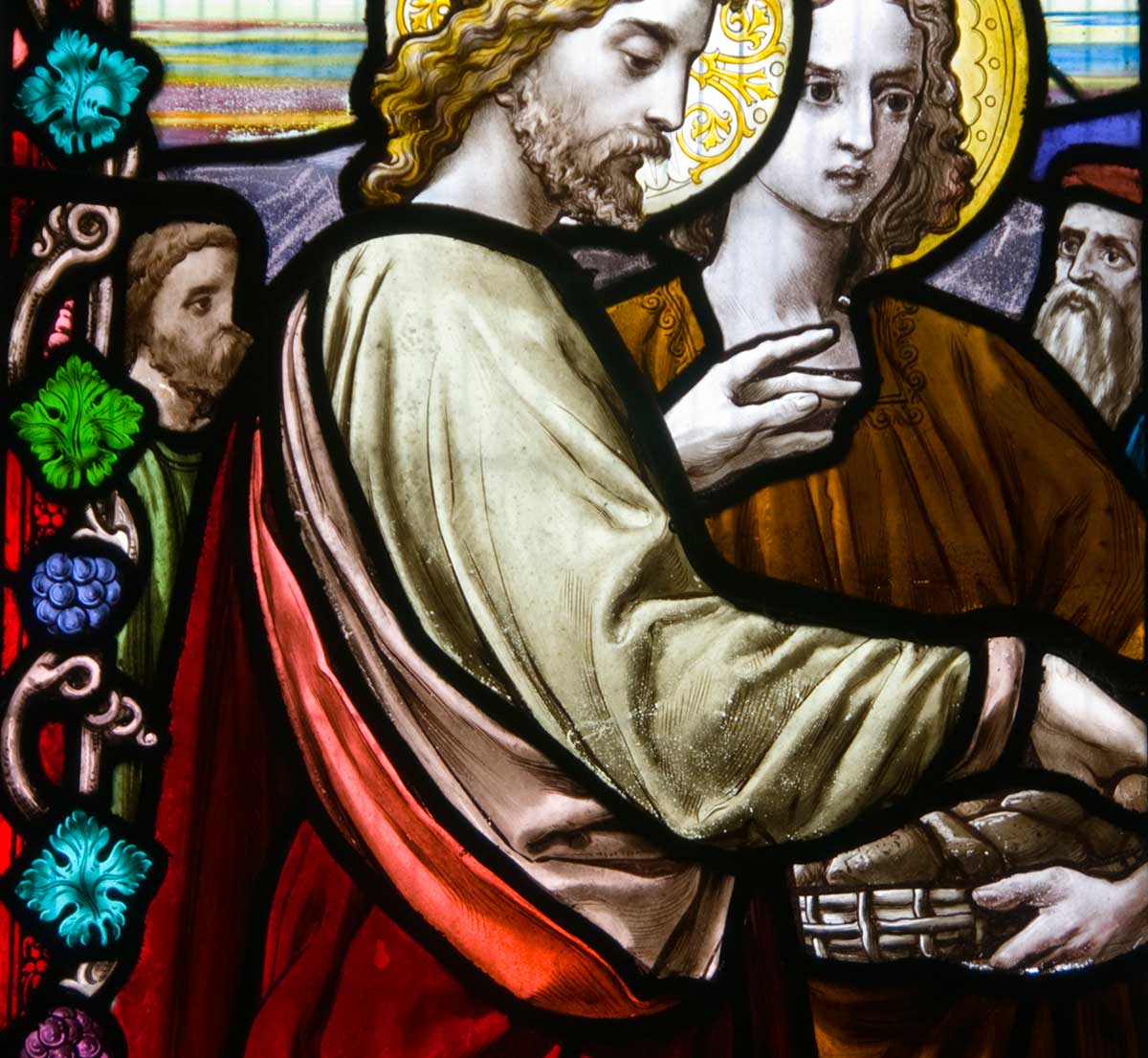Voting as Christians
If a person is married, believes in God, goes to church, reads the Bible, and prays, chances are he will vote Republican—and he is a core member of the dreaded Religious Right. If a person is unmarried, never goes to church, never reads the Bible, and never prays, he will likely vote Democratic—and he belongs to the not-so-dreaded Secular Left. Certainly there are religious Democrats and irreligious Republicans, but according to the research of social scientists Louis Bolce and Gerald De Maio (“Our Secularist Democratic Party,” Public Interest, Fall 2002), the Democratic Party has become the political home of unbelievers. (See Rod Dreher’s article in this issue.)
Moreover, anti-Christian policies are far more entrenched in the Democratic Party than Christian policies are in the Republican. Republicans sometimes want to ignore abortion; Democrats want to promote it, and make it a litmus test. Despite their deep differences on other issues, all of the current Democratic presidential hopefuls made a pilgrimage to NARAL Pro-Choice America’s “celebration” of the thirtieth anniversary of Roe v. Wade to testify to their commitment to abortion. The Democrats have reinstituted the constitutionally banned religious test for federal positions. If a judge is a faithful Catholic or Evangelical, the Democrats will likely try to block his appointment as a federal judge, for fear that it would reduce the accessibility of abortion.
Pro-abortion forces have a strong, probably unshakeable grip on the Democratic Party; pro-life forces have a weaker grip on the Republican Party. Voting Republican might or might not advance the protection of the unborn; voting Democratic will inevitably lead to the further entrenchment of abortion in American society, even if the Democrat is a pro-lifer who survived the abortionists’ inquisitions.
Although the Democrats sometimes use libertarian language and claim they want to make abortion simply a matter between a women and her doctor, this is a lie. They want the government to fund abortion, to force insurers to cover abortion, to force Catholic hospitals to perform abortions, to prevent pro-life people from protesting abortion. The libertarian language cloaks a determination to use the government to forcibly “liberate” people from “oppressive and discriminatory” traditions, such as protecting the life of the unborn.
Marriage and religion are closely connected; procreation and a belief and trust in a Creator are closely allied. Those who reject the meaning that marriage, family, and traditional religion give to life suffer a void, which they try to fill by seeking meaning in politics. This was the curse of Europe in the twentieth century, as the false religions of Nazism and Communism captured state after state. The new religion of liberation has its totalitarian aspect: It seeks to free man from his inherited prejudices (marriage, family, Christianity) through an activist state. This state, having created the void, then makes everyone dependent upon itself for meaning, at least for the only meaning it sees that life can hold: a perpetual liberation, a society that transgresses all boundaries.
Abortion has now destroyed more human life than Hitler and Stalin did—45 million in the United States, and tens of millions more in countries that have legalized abortion, some under pressure from the United States.
In a democratic society, legitimacy depends upon the voters. Voters have ultimate control of the system and can change the government if they really want to. Voting fraud and stolen elections can slow down but not stop a determined public; the judiciary and the bureaucracy in the end have to follow a determined and long-term public mood. A Christian voter performs a moral act when he votes. The morality of a government and the morality of an individual Christian are not the same thing—because God has instituted governments to enforce earthly justice, and a Christian has a destiny and a goal beyond this earth—but both governments and individual men are subject to moral laws.
Governments are ordained to protect the innocent from evildoers, from enemies foreign and domestic, and those who would destroy a child in the womb are evildoers. The US Supreme Court has declared a class of human beings outside the protection of the law, and the American government therefore does not carry out one of the purposes for which God has ordained it.
In a recent statement, the Vatican reiterated what has been the constant teaching of Christianity:
Those who are directly involved in lawmaking bodies have a “grave and clear obligation to oppose” any law that attacks human life. For them and for every Catholic, it is impossible to promote such laws or to vote for them. . . . In this context, it must be noted also that a well-formed Christian conscience does not permit one to vote for a political program or an individual law which contradicts the fundamental contents of faith and morals.
This is common moral sense, which applies to anyone, Christian or non-Christian, believer or non-believer. We should not abandon our moral principles in the voting booth.
Leon J. Podles holds a Ph.D. in English from the University of Virginia, has worked as a teacher and a federal investigator, and is president of the Crossland Foundation. He is the author of The Church Impotent (Spence), Sacrilege (Crossland Press), and Losing the Good Portion: Why Men Are Alienated from Christianity (St. Augustine Press). Dr. Podles and his wife have six children and live in Baltimore, Maryland. He is a senior editor of Touchstone.
subscription options
Order
Print/Online Subscription

Get six issues (one year) of Touchstone PLUS full online access including pdf downloads for only $39.95. That's only $3.34 per month!
Order
Online Only
Subscription

Get a one-year full-access subscription to the Touchstone online archives for only $19.95. That's only $1.66 per month!
bulk subscriptions
Order Touchstone subscriptions in bulk and save $10 per sub! Each subscription includes 6 issues of Touchstone plus full online access to touchstonemag.com—including archives, videos, and pdf downloads of recent issues for only $29.95 each! Great for churches or study groups.
Transactions will be processed on a secure server.
more from the online archives

27.3—May/June 2014
Religious Freedom & Why It Matters
Working in the Spirit of John Leland by Robert P. George
calling all readers
Please Donate
"There are magazines worth reading but few worth saving . . . Touchstone is just such a magazine."
—Alice von Hildebrand
"Here we do not concede one square millimeter of territory to falsehood, folly, contemporary sentimentality, or fashion. We speak the truth, and let God be our judge. . . . Touchstone is the one committedly Christian conservative journal."
—Anthony Esolen, Touchstone senior editor









